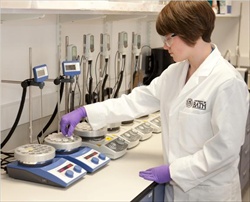Channels
Special Offers & Promotions
A Simple, Cost-Effective Route to Parallel Crystallisation
Asynt has supplied the Wilson
Structural Chemistry Research Group at the University of Bath (Bath, UK) with a
custom DrySyn heating block system.
 The adapted DrySyn system, designed by Asynt in conjunction with the University
of Bath, is being used to help simplify and accelerate development of
crystallisation methodology to selectively control polymorph formation, and to
generate multi-component crystals with favourable target physical properties such
as optical effects, solubility and porosity.
The adapted DrySyn system, designed by Asynt in conjunction with the University
of Bath, is being used to help simplify and accelerate development of
crystallisation methodology to selectively control polymorph formation, and to
generate multi-component crystals with favourable target physical properties such
as optical effects, solubility and porosity.
Control of the solid form of crystalline materials is desirable in many industrial sectors including the pharmaceutical and agrichemical industries where the production of different polymorphs, co-crystals or salts are known to affect significantly the physical properties of target active ingredients. There are many factors known to affect crystal formation including choice of solvent or solvents, temperature of crystallisation and the presence of additives or additional component in the crystallisation process.
Dr Lynne Thomas - a research fellow at the University of Bath commented "Temperature fluctuations in particular are known both to induce crystallisation and potentially can act as a switch controlling which stable crystalline form is obtained. Careful temperature control of samples crystallising is therefore of critical importance in this field, as is a heavily parallel approach to allow systematic investigation of the effect of crystallisation conditions on solid form. The number of potential temperature and solvent combinations thus makes screening conditions through a parallel approach to temperature controlled crystallisation much more efficient, and in many cases essential".
Dr Thomas added "In collaboration with Asynt, we have designed and installed custom heating blocks in our Crystallisation laboratory to optimise the temperature controlled space on each DrySyn heating block. The novel adapted DrySyn heating block, which enables precise control of 19 crystallisations in parallel, has proven its ability to increase the flexibility and speed of low to medium throughput crystallisation experiments".
For further information on adapted heating blocks for parallel crystallisation please contact Asynt on +44-1638-781709 or sales@asynt.com. For further information on the Wilson Research Group at the University of Bath please click here
Asynt is a leading supplier of affordable products, consumables and services for chemists in industry and academia. With staff of trained chemists - Asynt is able to draw upon this in-depth applications knowledge to provide a high level of customer support for its DrySyn Heating Blocks, Controlled Lab Reactors, Synthesis Tools, Evaporators, Circulators, Temperature Control Systems, Vacuum Pumps and Laboratory Safety Equipment.
 The adapted DrySyn system, designed by Asynt in conjunction with the University
of Bath, is being used to help simplify and accelerate development of
crystallisation methodology to selectively control polymorph formation, and to
generate multi-component crystals with favourable target physical properties such
as optical effects, solubility and porosity.
The adapted DrySyn system, designed by Asynt in conjunction with the University
of Bath, is being used to help simplify and accelerate development of
crystallisation methodology to selectively control polymorph formation, and to
generate multi-component crystals with favourable target physical properties such
as optical effects, solubility and porosity.Control of the solid form of crystalline materials is desirable in many industrial sectors including the pharmaceutical and agrichemical industries where the production of different polymorphs, co-crystals or salts are known to affect significantly the physical properties of target active ingredients. There are many factors known to affect crystal formation including choice of solvent or solvents, temperature of crystallisation and the presence of additives or additional component in the crystallisation process.
Dr Lynne Thomas - a research fellow at the University of Bath commented "Temperature fluctuations in particular are known both to induce crystallisation and potentially can act as a switch controlling which stable crystalline form is obtained. Careful temperature control of samples crystallising is therefore of critical importance in this field, as is a heavily parallel approach to allow systematic investigation of the effect of crystallisation conditions on solid form. The number of potential temperature and solvent combinations thus makes screening conditions through a parallel approach to temperature controlled crystallisation much more efficient, and in many cases essential".
Dr Thomas added "In collaboration with Asynt, we have designed and installed custom heating blocks in our Crystallisation laboratory to optimise the temperature controlled space on each DrySyn heating block. The novel adapted DrySyn heating block, which enables precise control of 19 crystallisations in parallel, has proven its ability to increase the flexibility and speed of low to medium throughput crystallisation experiments".
For further information on adapted heating blocks for parallel crystallisation please contact Asynt on +44-1638-781709 or sales@asynt.com. For further information on the Wilson Research Group at the University of Bath please click here
Asynt is a leading supplier of affordable products, consumables and services for chemists in industry and academia. With staff of trained chemists - Asynt is able to draw upon this in-depth applications knowledge to provide a high level of customer support for its DrySyn Heating Blocks, Controlled Lab Reactors, Synthesis Tools, Evaporators, Circulators, Temperature Control Systems, Vacuum Pumps and Laboratory Safety Equipment.
Media Partners


